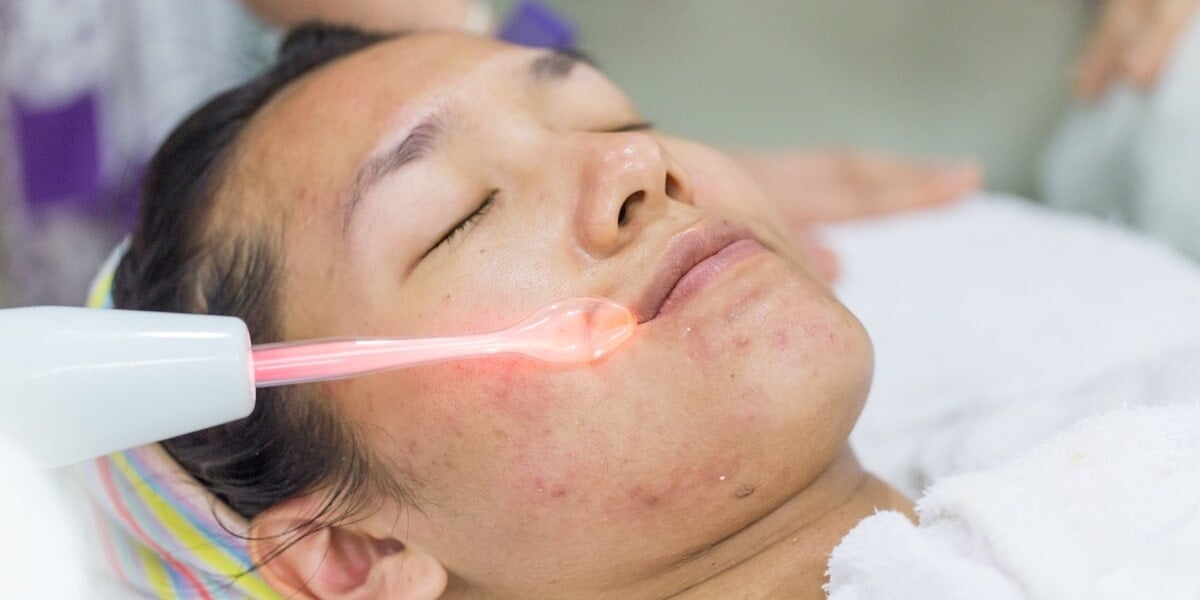How To Use Red Light Therapy for Acne
Acne is a mild nuisance for some people and reduces the quality of life in others. The skin condition can be painful, cause long-lasting scarring, and erode the confidence of those with acne. Red light therapy uses the power of light to help promote healing, reduce inflammation caused by severe cystic acne, relieve pain, improve the appearance of the skin, and reduce scarring.
Acne usually begins in puberty and occurs mainly in adolescents and young adults, but the skin condition can persist into the 30s and 40s. The condition develops when oil and dead skin cells clog the hair follicles beneath the skin’s surface. An overproduction of sebum, the oil that keeps skin supple, contributes to the development of acne.
Symptoms of acne include blackheads, pus-filled pimples, and large, red, tender bumps. While acne isn’t life-threatening, it can cause embarrassment in ways that prevent you from leading your best life possible. In research studies, some people say their acne makes them feel unattractive; others say it makes them feel on edge. Some teens say they feel too self-conscious to participate in sports, jobs, or participate in class. Acne can even affect your emotional health — people with the skin condition often develop anxiety and depression.
Treatment for acne includes over-the-counter creams, cleansers, and antibiotics. Unfortunately, not all acne treatments work for everyone, and there are very few treatments for acne scars and red spots. The good news is that you can get real results from red light therapy for acne.
Use Red Light Therapy For Acne
Red light therapy promotes healing from acne. It works deep beneath the surface of your skin to help repair and soothe irritated tissue.
Use Red Light Therapy To Get Rid Of Red Spots Caused By Acne
Acne damages the skin in ways that can cause changes to the skin tissue. The trauma of acne can cause temporary darkening of the skin, a condition known as post-inflammatory hyperpigmentation. Injuries cause inflammation. As this inflammation heals, the skin produces extra melanin, a natural substance that gives your skin, hair, and eyes their color.
Melanin also has protective qualities. It protects your skin from the sun’s harmful UV rays by turning your skin darker, or tanning, to create a protective barrier. Your skin also produces melanin in reaction to irritation and inflammation, both associated with acne.
The extra melanin causes a dark spot to form as the pimple heals. Squeezing, picking, or scratching a pimple can worsen the dark spots.
While the dark spots associated with acne are temporary and usually clear up themselves, they can take 3 to 24 months — or longer — to go away. Repeated trauma, such as picking at the pimple, can cause the hyperpigmentation to last even longer.
Red light therapy for acne stimulates circulation to deliver inflammatory mediators, which are natural substances that control swelling, to the injured skin tissue. The inflammatory mediators prevent the inflammation that triggers the melanin, which means red light therapy stops the dark spots from developing in the first place.
Get Rid Of Acne Scars
Scars can develop when the trauma of acne damages your skin’s derma, which is the layer of tissue just below the surface of your skin. Your body produces collagen to help your skin heal from acne. Collagen fibers can help skin heal quickly, but overgrowth and poor distribution of collagen can cause a scar to form.
Red light therapy can also address acne scars by improving the distribution of collagen fibers, thereby preventing the formation of visible scar tissue. Laser resurfacing, which also uses the power of light energy, can also remove damaged skin and scar tissue.
Combine Red Light Therapy With Other Treatments
Red light therapy for acne can be used with other acne treatments, such as exfoliants that scrub away the dead skin cells contributing to acne.
Get The Most Out Of Your Red Light Therapy
Optimize your results from red light therapy for acne by removing all sunscreen and makeup products from the affected area before your treatment. These products can block the red and near-infrared LED rays used in red light therapy.
As long as sensitivity is not an issue, you can use anti-acne skincare products following your red light therapy. You can use beta hydroxy acids (BHAs), which cut through the sebum and clear out your follicles to reduce pimples and blackheads. Use salicylic acids after red light therapy to exfoliate your skin and clear your pores.
For more information about the benefits of red light therapy for acne, consult your skincare specialist, dermatologist, or red light therapy professional. Get clearer skin today with red light therapy for acne.

